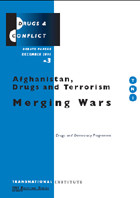Merging Wars Afghanistan, Drugs and Terrorism
Topics
With the new international context of the war against terrorism, the war on drugs moves centre stage as well. While drugs and terrorism are now shoved together to demonise the ‘evil’ enemy, reality is the victim. Blending the two wars to one seriously endangers the advances made to find a solution to the drug problem.

Authors
The connection between terrorism and the illicit drug trade has made the headlines after the terrorist attacks of September 11. In their public statements, leaders of the international alliance against Osama Bin Laden and the Taleban repeatedly stressed that not only were innocent civilians terrorised, but poisoned with heroin as well. What is more, drug profits were also used to finance terrorist attacks.
With the new international context of the war against terrorism, the war on drugs moves centre stage as well. While drugs and terrorism are now shoved together to demonise the ‘evil’ enemy, reality is the victim. Blending the two wars to one seriously endangers the advances made to find a solution to the drug problem. In this issue of Drugs & Conflict an attempt is made to restore the facts and separate these merged wars again.
Today, the two major producers of opium poppy and coca, Afghanistan and Colombia, are in the midst of shifting counterdrug strategies. We will look at the case of Afghanistan, analysing the UN International Drug Control Programme (UNDCP) ill fated interventions. And while international attention is focused on Afghanistan, the linkage of drugs and terrorism is endangering the troubled peace talks between the government and the FARC guerrilla in Colombia.
Pages: 21


